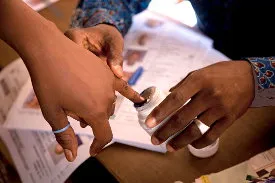
On 20 March, five countries and one semi-autonomous archipelago in Africa are going to the polls – get ready for the presidential elections in Benin, Niger and the Republic of Congo, the elections to the national assembly in Cape Verde, the rerun of presidential and assembly elections in Zanzibar and the constitutional referendum in Senegal.
In Benin and Niger, second round elections are taking place to finally determine who will run the countries over the next five years. The constitutional two-term limit presented an opportunity for an open field of candidates in Benin. And sure enough, candidates put themselves forward resulting in 33 candidates on the ballot for the first round, organized on 6 March. With 28 and 25 per cent of the voters’ support, Prime Minister Lionel Zinsou will stand against businessman Patrice Talon in the run-off elections this Sunday. The peaceful first-round elections bode well for Benin to continue its march towards a deeper democracy and to serve as a democracy champion on the continent.
In Niger, the run-off contest between incumbent president Mahamadou Issoufou and opposition candidate Hama Amadou is growing increasingly tense. In a statement on 8 March, the Coalition for an Alternative stated that the candidature of Amadou, who has been in prison since November on baby-trafficking charges, was suspended. The charges have been denounced by the coalition as political repression. A few days later, however, Amadou through his lawyer confirmed that he will indeed take part in the run-off election.
In addition to denouncing Amadou’s imprisonment, the opposition claimed that the announcement of the results of the first round were not in accordance with procedures. While Issoufou, who won 48 per cent of the votes in the first round, is likely to win a new term in office, the participation of the runner-up candidate is important to the process. Provided that potential claims of irregularities are fought in the courts instead of in the streets of Niamey, it would be further a step in the right direction.
In one of the two controversial referenda on the third term issue last year, the incumbent in the Republic of Congo, President Denis Sassou Nguesso, won the right to run for a third term. On Sunday, Nguesso will stand for re-election. The opposition is already crying foul, claiming that the election will be held under unsuitable conditions – including rigging. All but one potential opposition candidate – General Jean-Marie Michel Mokoko, previous advisor to the president on security and peace – have boycotted the election. Notwithstanding being considered a highly respected candidate, Mokoko will have a hard time facing the well-oiled electoral machinery of Nguesso’s labour party on Sunday.
In Cape Verde, the 72 seats in the National Assembly are up for grabs. The small island country has in effect a two-party system dominated by African Party for the Independence of Cape Verde (Partido Africano da Independência de Cabo Verde, PAICV) and the Movement for Democracy (Movimento para Democracia, MpD). PAICV have had a slight two-seat majority in the house since the 2011 election, but the sitting president is from the MpD. The election to the assembly will thus also give an important indication of the relative strength of the political parties in relation to the presidential contest that will take place later this year.
In semi-autonomous Zanzibar, voters are going to the polls once again after the dubious nullification of the elections organized on 25 October. The opposition, calling the nullification political and unlawful, has announced that they will boycott Sunday’s rerun. Taking into consideration past elections-related violence between the two main political contenders – in 2001 almost 50 people were killed and thousands fled as a result of the post-election clashes – the 20 March elections presents a serious test to political stability on the archipelago.
Last but not least: The constitutional referendum in Senegal aims to reduce the presidential term from seven to five years. The reduction has been on the political agenda for years. The referendum came about as a result of the pronouncement of the Constitutional Council’s last month to reject incumbent President Marcky Sall’s proposal in what was called a unilateral decision, and to argue that the constitutional change would require popular consent to be enacted. The referendum has been preceded by fierce debate and massive voter mobilisation efforts. The Ministry of Interior which is responsible for administrating elections and referenda has validated voting cards to cater for high turnout among Senegalese citizens including diaspora communities particularly in France, Italy and Spain.
On Africa’s Super Sunday, millions will go to the polls to express their views on the political leadership and futures of their countries. In Cape Verde and Senegal voting has been institutionalized and effectively serves as driver for democratic development and delivery to the public. Benin as a transitional country has made considerable progress, according to the Electoral Integrity Project’s annual report on the Year in Electionspublished on 8 March. This small West African country has made considerable gains in protecting the integrity of elections. Developments in Niger and the Republic of Congo – where the electoral process is denounced even before election day – are worrying. Whether elections will be capable of unlocking the political stalemate in Zanzibar or contribute to new tensions, is difficult to tell at this point.
The international community – in particular regional organizations and networks in Africa – would do well to follow the situation and work with state and none-state actors alike to prepare the ground for more inclusive, transparent and peaceful elections in the coming years.



